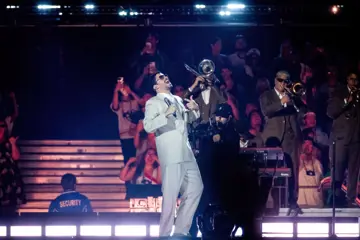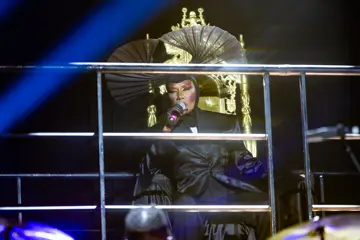Following the tragic deaths of teenagers, Thomas Kelly in 2012 and Daniel Christie in 2013, who were both killed by unprovoked coward punches in Sydney's King Cross, the NSW Government brought the lockout laws into the city in early 2014, meaning all bars and clubs within the CBD could no longer allow patrons into venues after 1.30am, as well as introducing a complete cut-off of drinks service at 3am.
As the legislation is up for review this year, a fine line has been drawn between those who support the laws and those who want it scrapped. However, those against lockouts have been heartened by the fact that the current NSW Government has agreed to meet with activists to discuss and debate Sydney's nightlife over the coming months, on the back of a number of protest and rallies, one of which garnered a crowd of 15,000 people in February.
"They can't just ignore what is a very, very broad reaching community concern around the very knee-jerk, top-down reaction of imposing lockouts."
Speaking to The Music, Greens MP Jenny Leong said the move is incredibly important in getting rid of the laws, which have been blamed for the closure of a number of popular venues in the last year, as a number of owners have struggled financially since the inception of the laws.
"It's clearly a positive sign that the government has realised that they can't just ignore what is a very, very broad reaching community concern around the very knee-jerk, top-down reaction of imposing lockouts on the Sydney CBD and Kings Cross," Leong says.
Don't miss a beat with our FREE daily newsletter
"I think what we can take from that is the fact that now the government appears to be listening, is now is the time for everybody that has a view on the fact that we can actually keep our city open and safe, means that they should engage with this process."
However, Peter Young of the 2011 Residents Association, a collective of Kings Cross residents who represent the local community, believes the lockout laws have had a hugely positive impact on the community.
"Residents are no longer afraid to attend the shopping centre of Darlinghurst Road and Bayswater Road on Friday and Saturday nights after 10pm and before 8am the next morning," Young says.
"Those residents who previously reported that most Saturday and Sunday mornings they discovered vomit, faeces and or urine on their front steps, now rarely do and are relieved of the task of cleaning them down.
"Many residents had severely disturbed sleep on Friday and Saturday nights. They now report undisturbed sleep. Residents whose work shifts required them to be at work early in the morning say that driving through the main street between 4am and 7am before lockouts was a nightmare and very stressful. People would often run onto the street and bang on their car. Drunken people would often dart out or stray onto the road and it was necessary to brake hard to avoid a collision."
Leong acknowledges that while there are issues in Kings Cross, putting restrictions on the city, which has experienced a 58% drop in foot traffic since 2012, is counter-productive.
"I think that everyone would agree that there were problems in Kings Cross," Leong concedes.
"People would often run onto the street and bang on their car. Drunken people would often dart out or stray onto the road."
"I think everyone would agree that the idea of just having a high-intensity-high-density-level of commercial late-night booze barns and liquor outlets with very little else is a huge problem. I think that everyone would also agree that we need to do more in society to deal with alcohol-related violence and anti-social behaviour.
"The question is, is the solution to shut everything down or is the solution to look at what is causing the problem? And we know that what's causing the problem is actually the fact we don't see a diversity and a healthy mix of venues. So when we're planning our city and inner-city areas, we need to be looking at encouraging other options that aren't just about people consuming alcohol...how are we making sure that there's adequate transport...but also making sure that residents' concerns are listened to. There are other measures in place that can address these problems, but what we saw was just a complete shutdown of the entire area."
Young insists that any belief that Sydney's nightlife has been damaged are "greatly exaggerated".
"Many young people, that members of our Association have spoken with, have said lockouts have not affected their 'going out', they are happy to find a venue with their friends by 1.30am, and settle in.
"They are not devastated by the inability of licensees to serve them drinks after 3am. They have expressed disappointment that on occasions they may have wished to stay longer than 3am at a venue, the venue owner has chosen to shut the venue and kicked them out. They considered an option would be for the venue owner to charge a cover charge, stay open and serve soft drinks."
The city's nightlife isn't the only thing that's taken a beating in Sydney, as recent figures showed a 40% drop in live music performance revenue within the CBD lockout area.
In a recent chat with The Music, Live Music Office Policy Director, John Wardle said the data "reflects trends in the first year of the lockouts in Sydney".
"The sustainability of venues in the city has been raised with the NSW government in consultation and advocacy since the CBD plan of management was introduced," Wardle said, adding that the figures "need a response from the NSW government if these businesses are to survive."
Alongside the Live Music Office, the Leichhardt Council has been pushing for a boost in Sydney's live music scene and last month, Leichhardt Mayor Darcy Byrne called for live music venues to be exempt from the laws.
"Basically the [NSW] government has shut out the voices of young people and not-so-young people who actually attend live music in the CBD and refused to listen," Byrne told The Music.
"So having a government taking the lead in actually surveying audiences about their views I think is an important and respectful thing to do."
"The [NSW] government has shut out the voices of young people and not-so-young people who actually attend live music in the CBD."
Byrne said that the government agreeing to meet with activists over the coming months proves that NSW Premier Mike Baird is feeling the pressure after he has been accused in recent months of favouring The Star Casino and soon-to-be-built Barangaroo, which fall outside of the lockouts zone.
"With thousands of music lovers now mobilised to save Sydney's nightlife it's time for the Premier to stop listening to the casino lobby and start listening to young people in this city," Byrne said.
"The Government's faulty legislation needs to amended to protect live music venues, before it's too late."
However, live music expert Clayton Ries, who is leading the City of Sydney-pilot program AMPLIFY, believes that live music is largely unaffected by the lockout laws.
In an interview last December, Ries said, "I don't think lockouts really have anything to do with the live music scene and the way it is at the moment.
"They're being affected by late night trade, so if for example you're based in Sydney at Oxford Art Factory and things like that, to have a second wave of income, that's definitely a factor.
"But in terms of the live music program itself I don't see the issue..."
Speaking at a youth panel last year, NSW police officer Scott Weber said the laws are all about keeping people safe and that his biggest regret is "that two people had to die for this to actually get over the line."
Leong refutes claims that safety can be guaranteed simply by putting restrictions on an area.
"As I've said before and I think it's something really key to remember - it's not a Cinderella-like option," she says.
"Drunken dickheads don't just magically appear at 1.30 or 3am in the morning. They actually can be there day or night and there needs to be measures in place to protect the community and to keep people safe when they're going out."
With a review of the lockout laws expected to be delivered this August, Young insists that the results have been too great to make changes.
"The lockout laws have seen a significant improvement in residential amenity compared to the situation that existed in the years leading up to lockouts, particularly since 2007," he says.
"The lockouts have also seen a significant reduction in crime (alcohol fuelled violence) and in hospitalisations/injuries. They are working. I don't see a reason to change them."
However, Leong hopes to see changes in the legislation that will benefit both those who want to enjoy Sydney's nightlife, as well as its residents.
"I hope that now with this review, what we see is a balance to recognise that you actually don't have to shut down our city to make it safe - that we can actually have a safe and open and vibrant Sydney that actually doesn't impact negatively on residents and that doesn't have the kind of repercussions that we were saying occur in the Cross and other places.
"I would hope that this review now will actually give us the opportunity to remove the lockouts, but instigate some measures that will address people's concerns around safety and alcohol related violence, while at the same time, allowing people to go out at all hours of the morning and party if they want to."















